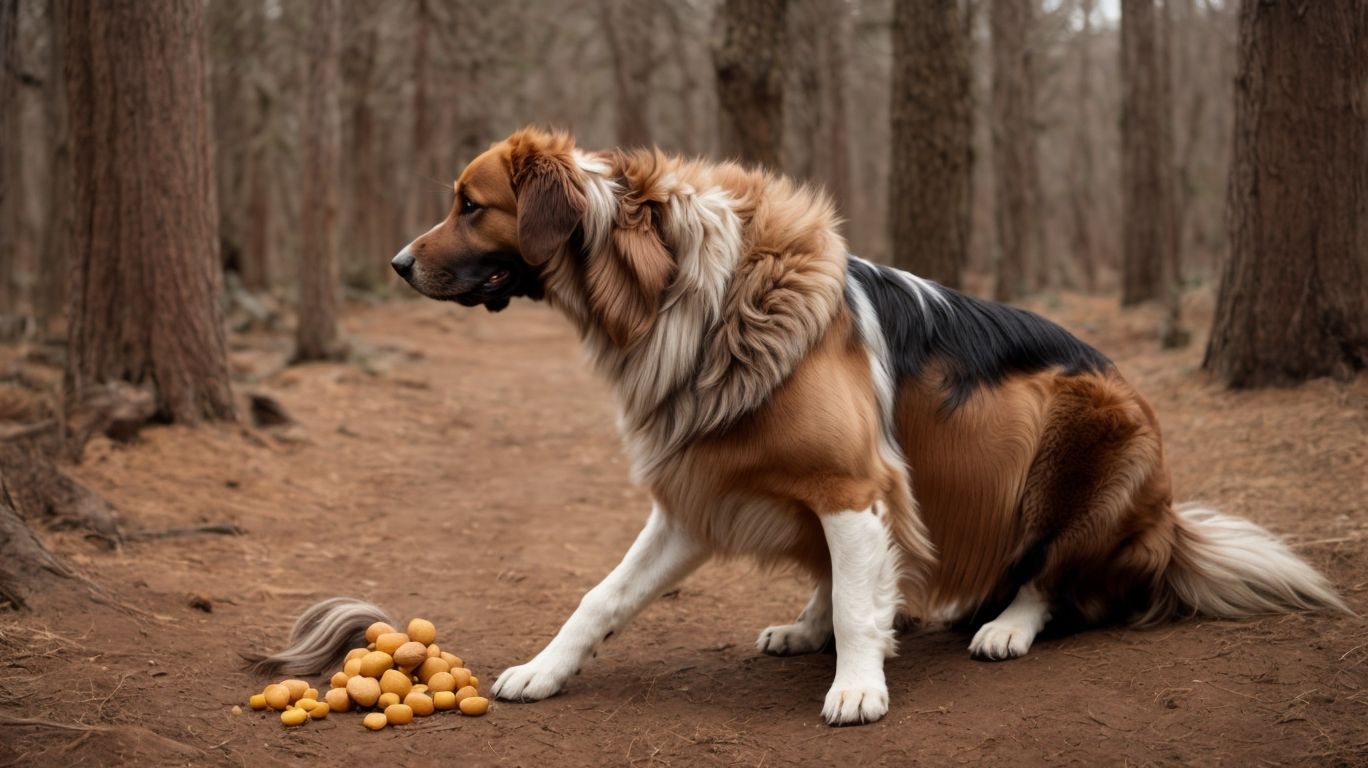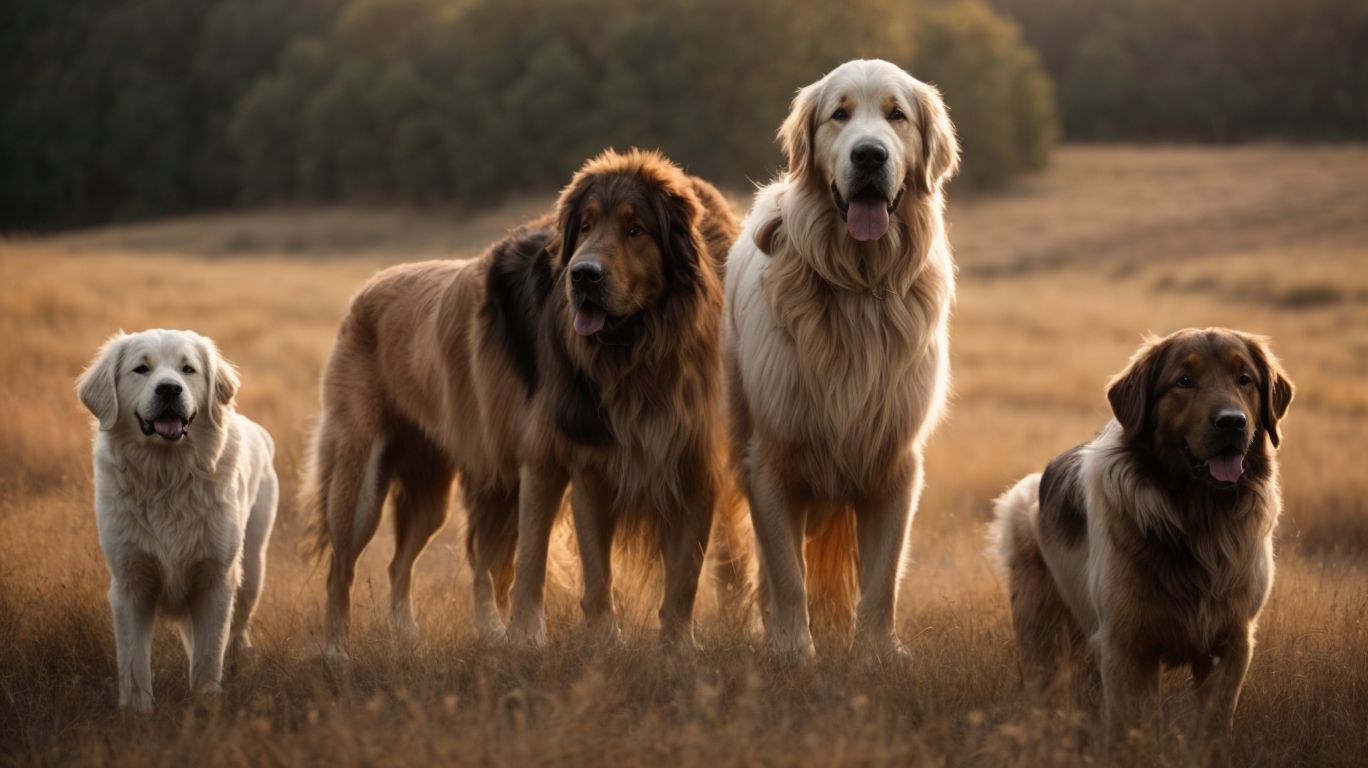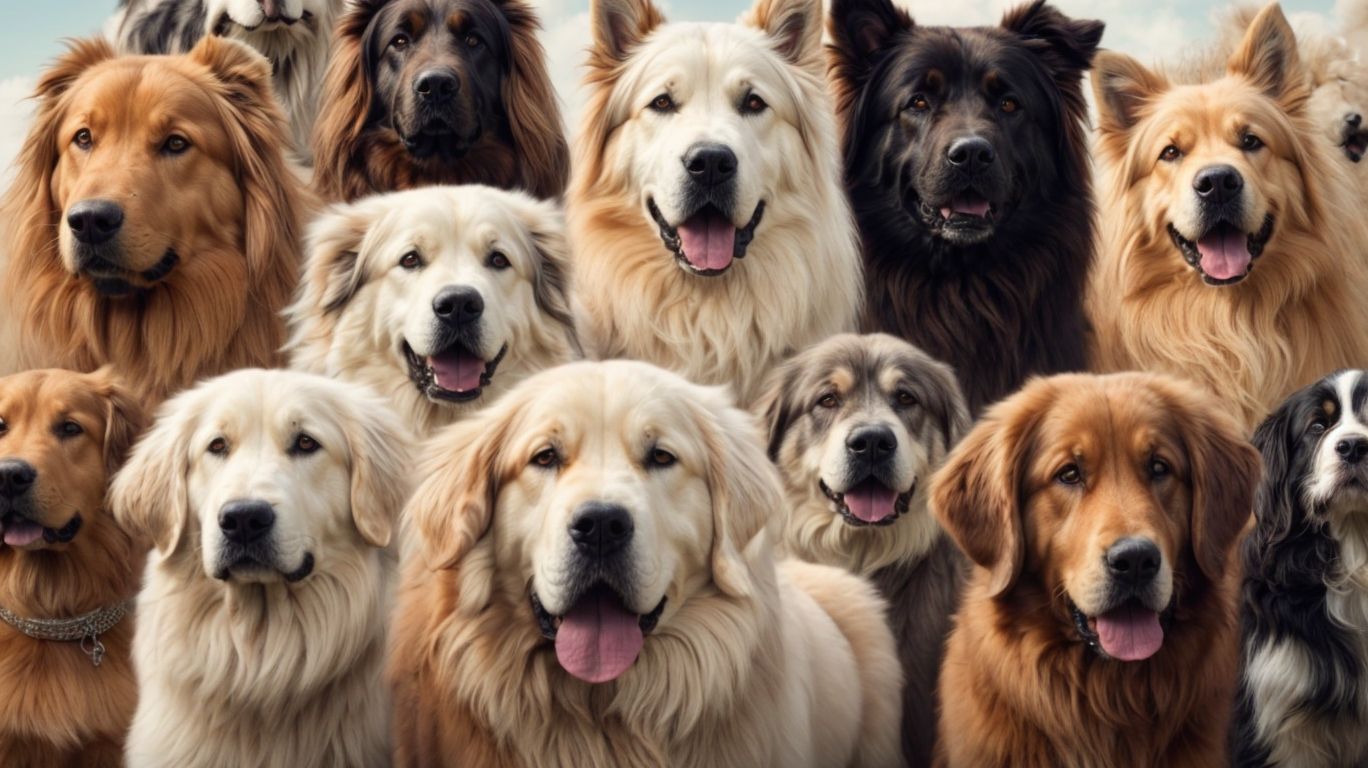
Nutrition for Giants: Customizing Diet for Large Breed Senior Dogs
As our beloved furry friends age, their nutritional needs change, especially for large breed senior dogs.
In this article, we will explore the specific dietary requirements of these gentle giants, including essential nutrients, protein and fat content, as well as recommended vitamins and minerals.
We will also discuss how to create a customized diet plan tailored to their individual needs, including calculating daily calorie intake and choosing the best sources of protein, fat, vitamins, and minerals. We will address special considerations for large breed senior dogs, such as common health issues and adjusting their diet accordingly. Whether you’re a pet parent or a professional in the field, this article aims to provide valuable insights into optimizing the nutrition for our aging canine companions.
What Are Large Breed Senior Dogs?
Large breed senior dogs refer to canines of considerable size and advanced age, necessitating specific dietary considerations to promote their health and well-being.
As these dogs age, their metabolism may slow down, making them more prone to weight gain and associated health issues. Therefore, their diet should be rich in high-quality proteins to support muscle mass and joint health.
They may require adjustments in their nutrient intake to meet their changing energy requirements and to manage conditions such as arthritis or mobility concerns. Tailored nutrition plans for large breed senior dogs are essential to ensure they receive the right balance of nutrients and maintain a healthy, active lifestyle as they age.
Why Do They Have Different Nutritional Needs?
The distinct nutritional requirements of large breed senior dogs stem from the aging process and the prevalence of age-related health issues, emphasizing the need for specialized diets to address their specific needs.
As dogs age, their metabolism slows down, and they may become less active, leading to potential weight management concerns. Senior dogs are more susceptible to certain health conditions such as arthritis, joint pain, and reduced mobility. This highlights the need for diets rich in joint-supporting nutrients like glucosamine and chondroitin. Additionally, their decreased ability to absorb nutrients further emphasizes the importance of high-quality protein, omega-3 fatty acids, and easily digestible carbohydrates in their diet to support overall health and wellness in their senior years.
Understanding the Nutritional Requirements of Large Breed Senior Dogs
Understanding the nutritional requirements of large breed senior dogs involves a comprehensive assessment of their specific needs in relation to aging and age-related health issues. This emphasizes the critical role of customized diets in supporting their overall health and well-being.
As dogs age, their bodies undergo various changes that impact their nutritional needs. These changes may include reduced metabolism and potential joint issues. To address these concerns, it becomes essential to focus on nutrients like glucosamine and chondroitin to support joint health, as well as controlled levels of protein and fat to maintain an ideal body condition.
Specialized senior dog diets often incorporate supplements like omega-3 fatty acids and antioxidants to address cognitive function and support the immune system.
What Are the Essential Nutrients for Large Breed Senior Dogs?
The essential nutrients for large breed senior dogs encompass a balanced combination of protein, fat, carbohydrates, vitamins, and minerals, vital for their overall health and well-being as they age.
Nutrients are essential for supporting the energy levels, muscle strength, and joint function of senior dogs. Protein helps maintain lean muscle mass, while fat provides concentrated energy. Carbohydrates fuel their active lifestyle. Vitamins and minerals, like vitamin E and glucosamine, support immune function and joint health. A balanced intake of these nutrients is crucial for promoting longevity and vitality in large breed senior dogs.
How Much Protein Do They Need?
Determining the ideal protein intake for large breed senior dogs involves a nuanced assessment of their individual needs. Factors such as age, activity level, and overall health should be considered to ensure adequate support for their muscles and vital bodily functions.
As large breed senior dogs age, their metabolism and muscle mass may change. This makes it crucial to adjust their protein intake accordingly. A protein-rich diet can aid in maintaining lean muscle mass, promoting joint health, and supporting their immune system.
The quality and digestibility of the protein sources play a key role in meeting their requirements. Weight management also factors into their protein needs, as excess weight can strain joints and make them more susceptible to age-related conditions. Thus, tailoring protein intake to the specific needs of large breed senior dogs is essential for promoting their overall well-being.
What Is the Ideal Fat Content for Large Breed Senior Dogs?
Determining the optimal fat content for large breed senior dogs involves considering their energy needs, coat and skin health, and overall well-being. This highlights the important role of healthy fats in supporting their aging bodies.
Healthy fats, such as omega-3 and omega-6 fatty acids, are crucial for maintaining the health and vitality of senior dogs. These fats support energy levels, keep skin supple, and contribute to overall well-being. As dogs age, their bodies may need extra support to maintain a healthy weight and energy levels. Incorporating healthy fats into their diet can help achieve this. It’s important to provide the right balance of fats to ensure senior dogs remain active, healthy, and enjoy a good quality of life.
What Are the Recommended Vitamins and Minerals for Large Breed Senior Dogs?
The recommended vitamins and minerals for large breed senior dogs play a pivotal role in supporting their immune system, bone health, and overall vitality, emphasizing the significance of a well-rounded and balanced diet to meet their specific needs.
Maintaining strong bones and supporting calcium absorption requires essential nutrients, including Vitamin D. The immune system can be bolstered by Vitamin C, while Vitamin E acts as a powerful antioxidant, protecting cells from damage. Additionally, minerals like calcium, phosphorus, and magnesium are crucial for bone health and muscle function in large breed senior dogs. It’s crucial to ensure these nutrients are present in their diet for their long-term health and quality of life.
Creating a Customized Diet Plan for Large Breed Senior Dogs
Crafting a personalized diet plan for large breed senior dogs involves meticulous attention to a balanced combination of high-quality ingredients designed to support their health, weight management, and joint support, ensuring that their specific dietary needs are met effectively.
This means considering factors such as their size, activity level, and any underlying health conditions.
Providing a balanced diet with the right proportions of protein, fats, and carbohydrates is crucial. Incorporating joint-supporting nutrients like glucosamine and chondroitin can help maintain their mobility and reduce the risk of arthritis.
Weight management plays a vital role in preventing obesity-related health issues. Customizing the diet to meet their individual needs is essential for promoting a healthy and active lifestyle in their golden years.
How to Calculate the Daily Calorie Intake for Large Breed Senior Dogs?
Determining the appropriate daily calorie intake for large breed senior dogs involves a detailed assessment of their activity level, age, and weight management needs, emphasizing the significance of portion control to maintain their overall health and well-being.
This process takes into account factors such as the dog’s metabolism, any existing health conditions, and the nutritional content of the food they consume.
Weight management is crucial for senior dogs to prevent obesity, which can lead to various health issues. Portion control plays a vital role in regulating calorie intake and ensuring that the dog receives the necessary nutrients without overeating. By carefully monitoring their calorie intake and adjusting it as needed, pet owners can promote the well-being and longevity of their beloved senior dogs.
What Are the Best Sources of Protein for Large Breed Senior Dogs?
Identifying the optimal sources of protein for large breed senior dogs involves selecting high-quality sources that promote joint support, muscle health, and overall vitality, emphasizing the impact of protein choices on their long-term well-being.
As large breed senior dogs, it’s crucial for them to have proteins with essential amino acids. Lean meats like chicken, turkey, and fish are excellent sources that help maintain muscle mass and support joint health.
Including foods like eggs, low-fat dairy, and legumes can also contribute to their overall vitality. Striking a balance between animal and plant-based protein sources is essential for a well-rounded diet and the well-being of these senior dogs.
How to Choose the Right Type of Fat for Large Breed Senior Dogs?
Selecting the appropriate type of fat for large breed senior dogs involves prioritizing options that support weight management, mobility, and overall health. This underlines the critical role of healthy fats in their aging process.
Healthy fats play a crucial role in maintaining a healthy weight for large breed senior dogs. They provide a concentrated source of energy and aid in weight control. These fats are also essential for promoting joint and muscle mobility, which is particularly important for senior dogs experiencing stiffness or arthritis.
To incorporate suitable fats into their diet, senior dogs can benefit from omega-3 fatty acids found in sources like fish oil, avocado, or flaxseed. These healthy fats can improve joint flexibility, reduce inflammation, and enhance overall wellbeing.
What Are the Best Sources of Vitamins and Minerals for Large Breed Senior Dogs?
Identifying the optimal sources of vitamins and minerals for large breed senior dogs involves prioritizing natural sources that facilitate nutrient absorption and vitality. This underscores the importance of natural preservatives for their overall well-being.
Senior dogs can benefit greatly from natural sources of essential nutrients, such as lean meats, fish, and eggs. These foods are rich in vitamins A, B, D, and E, which are crucial for maintaining healthy eyesight, skin, and overall metabolic functions.
In addition, green leafy vegetables and dairy products are excellent sources of minerals like calcium and phosphorus, which support strong bones and teeth. This is especially important for the vitality and longevity of senior dogs.
By including these vital nutrients in their diet, senior dogs can experience improved overall health and well-being.
Special Considerations for Large Breed Senior Dogs
Addressing the unique needs of large breed senior dogs entails special considerations such as obesity prevention, digestive health, dental health, and mobility support, all vital aspects in mitigating the challenges presented by the aging process.
Ensuring a balanced diet with the appropriate level of nutrients is crucial to prevent obesity in large breed senior dogs.
Monitoring their digestive health and providing easily digestible food can help manage any gastrointestinal issues.
Regular dental check-ups and dental care are important to maintain oral health, as senior dogs are prone to dental problems.
Supporting their mobility through exercise, joint supplements, and comfortable bedding can contribute to their overall well-being.
What Are the Common Health Issues in Large Breed Senior Dogs?
Common health issues in large breed senior dogs often revolve around age-related concerns such as joint support, mobility challenges, and age-related diseases, necessitating targeted nutritional approaches to address their specific health needs effectively.
As dogs age, their bodies undergo a natural decline in mobility and joint function. This can make them more susceptible to conditions like arthritis and hip dysplasia. These age-related concerns can greatly impact their overall well-being and quality of life.
Senior dogs are at a higher risk of developing age-related diseases such as cognitive dysfunction and organ-related issues. This highlights the importance of providing tailored care and support for them in their golden years.
How to Adjust the Diet for Senior Dogs with Health Issues?
Adapting the diet for senior dogs with health issues involves customizing balanced meal plans, incorporating senior dog food options, and integrating joint-supporting components such as glucosamine and chondroitin to alleviate their specific health challenges effectively.
This tailored approach ensures that senior dogs receive the essential nutrients, vitamins, and minerals to support their aging bodies. Senior dog food options often contain reduced calories and higher levels of beneficial nutrients, catering to their changing dietary requirements.
It’s crucial to consult with a veterinarian to identify specific health issues and adjust the diet accordingly. Integrating joint-supporting elements like omega-3 fatty acids can further aid in managing discomfort associated with aging and joint health.




No Comments